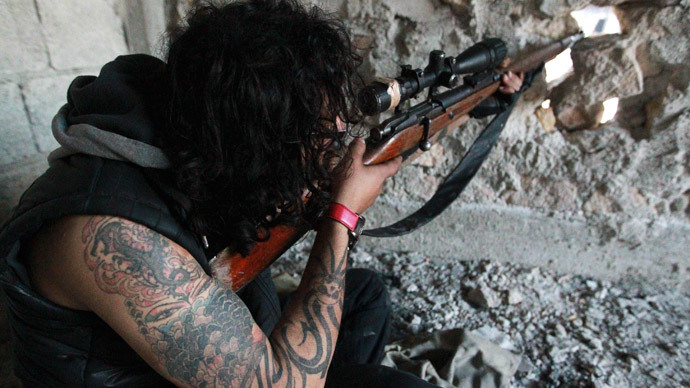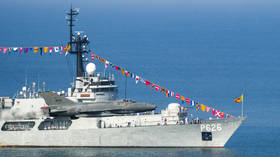Don Giovanni of West’s international policies

As I took in the opening night of Vancouver Opera’s Don Giovanni on the weekend, I realized there was something vaguely familiar about the libertine protagonist.
The unrepentant sociopath whose conquests number in the thousands and who remains indifferent to the pain and suffering he’s caused, didn’t just remind me of my ex boyfriend.
No, there was something more in his smug hubris, his unabated appetites, something that recalled dramas happening outside the theatre, in the Middle East, Latin America and Eastern Europe.
And then it dawned on me: Don Giovanni’s predatory technique of seduction and abandonment is nothing less than the modus operandum of US Foreign Policy.
As jilted politicos – from Noriega to the Shah of Iran to Saddam Hussein – can attest, the only thing worse than being an enemy of the US is being a former ally.
And yet the amazing thing is, just as with the seductive Don, people keep falling for the same tired old lines. “I think you’re really special, and I want to liberate you. Of course I’m not only interested in your oil fields. Your people deserve an autonomous state.” And let’s not forget the classic: “I’m here to bring you freedom and democracy honey.”
Why is it that so many folks – from the Free Syrian Army to the Ukrainian ‘rebels’ – are happy to sing Là ci darem la mano with their handsome suitor and head off to his gleaming palace, damning precedents notwithstanding?
While Don Giovanni’s conquests, as Leporello tells his spurned lover Dona Elvira in the famous ‘Madamina, il catalogo è questo’ (‘My dear lady, this is the catalogue’) include ‘640 in Italy, 231 in Germany, 100 in France, 91 in Turkey, but in Spain, 1,003’, he still keeps on truckin’, preying on women of all shapes, sizes and nationalities.
To date, as professor Zoltan Grossman notes, in his ‘History of US Military Interventions since 1890’, from Wounded Knee to Chile to Iraq, Afghanistan and Libya, the US has lots of ‘splainin to do.
They sure broke a lot of hearts in 1956 Budapest, 1968 Prague and 1991 in Southern Iraq to name only a few. And yet, just as the decidedly un-self-aware Don Giovanni, the US continues to sell itself as the apparently amnesiac romantic rescuer of the world’s unloved.

As Secretary of State John Kerry recently said of Russia’s invasion of the Ukraine, "You just don't in the 21st century behave in 19th-century fashion by invading another country on completely trumped up pretext.”
I know I’m not the only one who is reminded of Iraq whilst watching Don Giovanni. I know this because last year the Pittsburgh Irish & Classical Theatre produced a version of ‘Don Juan Comes Home from the War’ as ‘Don Juan Comes Home from Iraq’.
The original 1939 play, written by Odon von Horvath and adapted by British playwright Duncan Macmillan, evokes post-WWI-era Berlin, while the Pittsburgh adaptation was played as a kind of Tarantino inspired feminist revenge fantasy riff on the aging love ‘em and leave ‘em lothario. As one critic described it, “He’s alternately trying to reclaim his reputation as the great seducer and swearing he just wants to be good, but failing at both. The city that was his playground for sexual conquests now is filled with brokenhearted women who have lost husbands, fathers and sons, and it’s their turn to pounce.”
If I were to stage a production of Don Giovanni today, I would have a lot of fun with the casting. I can definitely see a role for Julian Assange or Edward Snowden – if they’re ever allowed to travel again - as the vengeance driven Dona Elvira who tries to warn unsuspecting victims of the Don’s treachery and deceit.
Leoperello – the Don’s hapless servant – could be played by mercenary extraordinaire Erik Prince.
I could see Kerry in the title role, singing his song of seduction convincingly it's all love, whoever is faithful only to the one is cruel to the others.
I might rename the Commendatore as General Blowback and dress him as either Saddam Hussein or a Taliban commander.
While Vancouver Opera’s version rather celebrated the violent demise of the amoral Don, perhaps La Scala’ s 2011 version was more realistic. The first scene features the handsome lead opening the curtain to reveal a giant mirror reflecting the audience – that included Prime Minister Mario Monti who had just come to power in the wake of Berlusconi’s scandals - back to themselves.
In the final scene, just as the wronged parties are waxing judgmental on the death of the Don, he appears behind them perfectly coiffed and immaculately dressed, calmly smoking a cigarette, smug and smiling.
In the real world, it seems there’s no shortage of eager lovers ready to jump into bed with the seductive vision of Pax Americana – one that survives in spite of its shocking infidelity.
So Là ci darem la mano darlings, Don Giovanni is alive and well and he’s ready to liberate you soon.
Hadani Ditmars for RT
Hadani Ditmars is a multi-platform journalist with 20 years of experience reporting from the Middle East and the author of ‘Dancing in the No-Fly Zone: a Woman's Journey Through Iraq’.
The statements, views and opinions expressed in this column are solely those of the author and do not necessarily represent those of RT.
The statements, views and opinions expressed in this column are solely those of the author and do not necessarily represent those of RT.












